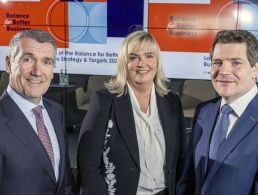It’s all smiles at fast-growing Irish fintech Dimply. SiliconRepublic.com gets the inside track on what it’s like working at a ‘hungry’ start-up.
On the day SiliconRepublic.com went to Dublin’s Dogpatch Labs to visit one of its member start-ups Dimply, we didn’t encounter very many of Dimply’s staff. The only people that were there were two of the start-up’s three founders, two other employees and its head of talent acquisition.
We say a quick hello to the two men working away on their laptops at Dimply HQ, which is ostensibly a long table in an upstairs section of Dogpatch. They share the room with a crypto start-up and from time to time the two teams banter with each other. Mostly though, it’s work. But everyone looks happy and content – whether that’s the coffee from the kitchen close by or the culture in Dogpatch we have yet to find out at this early point. Co-founders Colm McLoughlin, Alan Quinlan and head of talent Eoin O’Shea usher us into a meeting room where we can talk about these kinds of matters and not disturb the techies outside.
We chat about diversity in hiring and how start-ups have to compete with big corporate players to attract a sufficiently wide talent base. “We’ve been lucky here,” says McLoughlin. “I don’t know many start-ups that have actually invested in setting up their own talent search team internally. Eoin heads ours up and he has come to us from Apple.”
O’Shea is all about what he calls “hiring purposely” – not overhiring and only to then lay staff off as a lot of tech companies have had to do in recent months. He spoke about Dimply’s philosophy on hiring before when the start-up announced it was creating 20 jobs in October 2022. Like a lot of start-ups founded during the pandemic, Dimply is entirely remote, which explains why a lot of its staff aren’t around. They come into the Dogpatch Labs base periodically and meet at regular company offsites. In terms of employee culture, the leadership team is feeling its way in response to what McLoughlin calls the “new rules”.
The ‘new rules’ and hiring purposely
“A lot of companies had to unlearn the rules of hiring and relearn the new rules around diversity and sustainability and all of these goals. We set up in the lockdown. We didn’t have the luxury of meeting our first hires until post-lockdown. So we had people writing code and engineering and developing the product with us. We had accountants, solicitors, advisers, investors and staff working in the business that we’d never met. So we grew up not having to unburden and unlearn the old rules, we grew up in the new rules.”
“We do get asked about sustainability and hiring and diversity and inclusion and all that,” McLoughlin says, before adding that, “we’re in a hurry and we want to get the best people to build the best product”.
“And sometimes for a start-up, we can’t have these big, massive corporation kind of views on the world around us. Like, if we could get five brilliant designers in the door – some of them are girls, some of them are guys. That’s cool. We just want five great designers to build the product. We don’t have the luxury of having this really cool statement on that. But we are very conscious of DE&I and our board is actually very driven to make sure we are that type of business.”
O’Shea chimes in here, saying he doesn’t appreciate seeing “big statements on websites, saying: ‘We’ve got X amount of diversity’ – I just don’t think they’re adding to the conversation at all. It’s more about what you’re actually doing, rather than what you say you’re doing. A lot of statements I don’t think are being followed at all.”
“Judge me on what we’re doing, not what we’re saying. Even when we meet clients, we always show them the product, we don’t just tell them about it. Diversity is a bit like that, isn’t it?” Quinlan says.
How has having access to a remote talent pool helped Dimply to build out the team it needs to grow its business? “Well, it’s a broader talent pool if you’re remote straightaway, you know what I mean? You’’re not just limited to the greater Dublin area,” says Quinlan. Many of Dimply’s new hires come from internal referrals. “Eoin is able to shape the culture and the selection process,” McLoughlin says, while Quinlan jokes that the employees are doing O’Shea’s job for him. For a start-up team, Dimply are not at all intense and there is plenty of lighthearted banter, but they are still very serious about what they do.
Dimply founders Johnny Kane, Alan Quinlan and Colm McLoughlin. Image: Dimply
In the late afternoon, Dimply’s third co-founder, Johnny Kane comes in and the founding trio disappear into the bowels of the building to have their weekly brainstorm meeting. Before they go, McLoughlin tells us this meeting happens every week at this time without fail. It is a chance for them to come together and hash out ideas and update each other on what’s happening on their respective ends of the business – Kane is chief product officer on the design side, Quinlan is CEO and McLoughlin is focused on commercial growth.
While they are in their meeting, we get the lowdown on what it’s like working at a growing, ambitious fintech start-up from O’Shea and some of his Dimply colleagues who are good-natured enough to endure an inquisitive journalist encroaching on their space.
We learn that one of the two guys working away at Dimply’s single-desk HQ is only in his second week on the job. Later, McLoughlin tells us that one of the hires who made all the internal referrals told him on an offsite that getting to do the best work of his career was the reason why he kept recommending everyone to go and work at the fintech company.
“That was really cool,” McLoughlin says, recalling it. “A lot of the guys that you need to build a product like Dimply don’t even have LinkedIn profiles or CVs. They live in the ether of engineering and coding and they work with people they like on projects that excite them. They’re not incredibly driven by a lot of the earnings statuses etc, etc.” One of these workers is a guy with a PhD in maths based in Ukraine who writes incredibly complex documents that O’Shea jokes he can barely read, never mind understand.
Other new hires have come in from well-to-do Irish unicorns and other household-name international companies. “We never thought when we started out that we could attract such high-calibre people,” says McLoughlin. He says the approach they take with each employee is to view them as an “individual contributor” – they are trusted based on their skills to show up and get the work done, which they do. O’Shea, McLoughlin and Quinlan say they are routinely blown away by how much enthusiasm people display for building the product.
Not growth at all costs…
But they don’t want to appear too romantic about start-up life either. There is stress and volatility at times. Companies like Dimply have undoubtedly benefitted from people leaving the bigger companies and, as McLoughlin points out, a lot of people are actively turning away from the big tech players. “We had an intern in here and he was number one in his class in financial maths at the University of Galway. Some of the code and some of the mathematics and algorithms he wrote during the summer months are deployed live in the technology. I love that stuff. And I love that he turned down the Big Four to commit to a start-up for the summer.”
For start-ups like Dimply it’s all about the product. “There’s a pragmatism in this business that’s kind of scrappy, it’s hungry. And it’s prudent. And it’s really old-fashioned,” McLoughlin says. “We have no interest in growth at all costs. That’s not who we are. We want to assemble a brilliant team, we want to build brilliant products for brilliant customers, make a profit, and not be sitting around daydreaming about becoming a unicorn or the next Series A or Series B. Because all that’s folly, right? And I think a lot of folly has been exposed in the market. We’re building the products in such a way that we can actually license the products and the customisation can sit at the client site. We want to build products that have global impact and you need a really skilled team to do that.”
10 things you need to know direct to your inbox every weekday. Sign up for the Daily Brief, Silicon Republic’s digest of essential sci-tech news.




